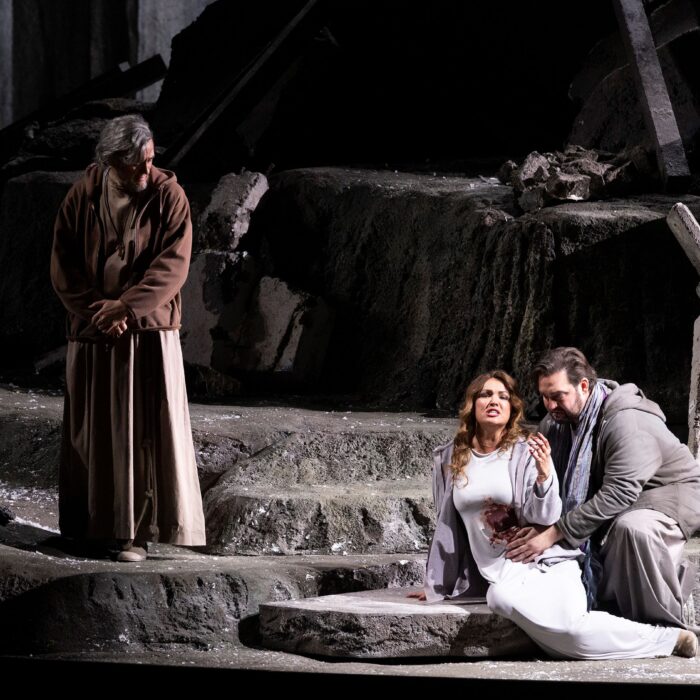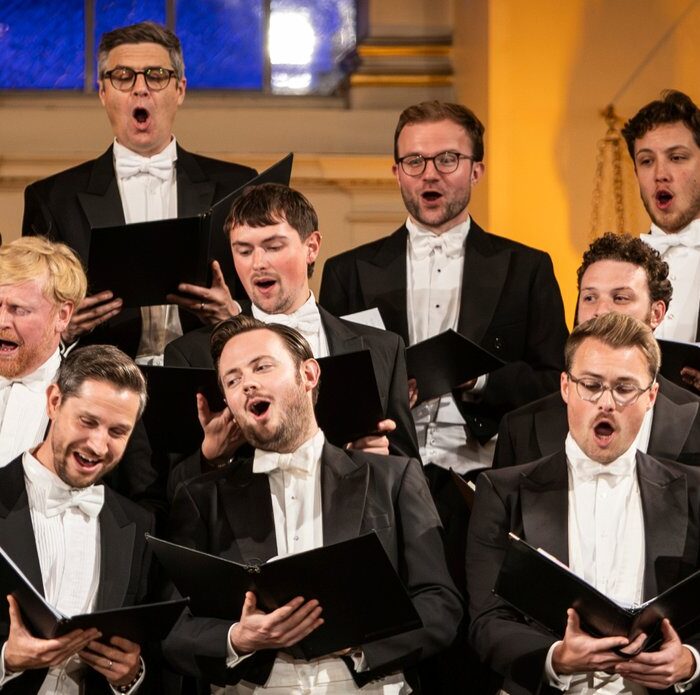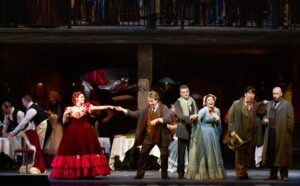
Metropolitan Opera 2024-25 Review: La Bohème
Conductor Kensho Watanabe & Stellar Cast of Stars Shine Bright
By Jennifer Pyron(Photos: Marty Sohl / Met Opera)
The Metropolitan Opera’s “La Bohème” celebrated a new season of success thanks to Kensho Watanabe at the podium and a stunning cast of favorites, including Ailyn Pérez, Dmytro Popov, Boris Pinkhasovich, Bogdan Talos, Emily Pogorelc, Gihoon Kim, and Donald Maxwell.
Conductor Kensho Watanabe’s Midas Touch
Conductor Kensho Watanabe, who made his Met debut with Kevin Puts’s “The Hours” in 2022, was the perfect choice for this production. As I noted about his performance of “The Hours” in May of this year, the same can be said about him for “La Bohème:” “Conductor Kensho Watanabe led the orchestra and cast members with effervescent amounts of grace and gratitude. Watanabe’s natural gift of channeling Kevin Puts’s music is astounding and it’s no wonder he was at the podium again. The swelling emotional rollercoaster that drives this score was like a bloodline extending from Watanabe. There was no separating what he was doing from any part of this whole production, and his signature frequency carried through in development with every role and turning point of the synopsis. It’s also important to note how Watanabe’s intuitive ability to proactively extend his energy toward the singers made every entrance feel very aligned and actively engaged. This contributed greatly to the music’s energy and never once did it feel like the opera was stagnating or losing momentum in its ability to freely flow.”
Watanabe continued to prioritize bringing the singers forward both musically and artistically in “La Bohème.” For example, in Act one when Dmytro Popov as Rodolfo began singing his aria, “Che gelida manina,” Watanabe stayed with Popov’s every note, breath, and gesture. It felt like Watanabe was making music together with Popov and the orchestra as easily as he was breathing along with each phrase of Puccini’s score. There was also a visible gentleness of his baton as he conducted, creating a thread of energy with Popov that connected back to his podium and exuded a profound level of awareness. The entire production felt magical because of his conducting – Watanabe’s midas touch.
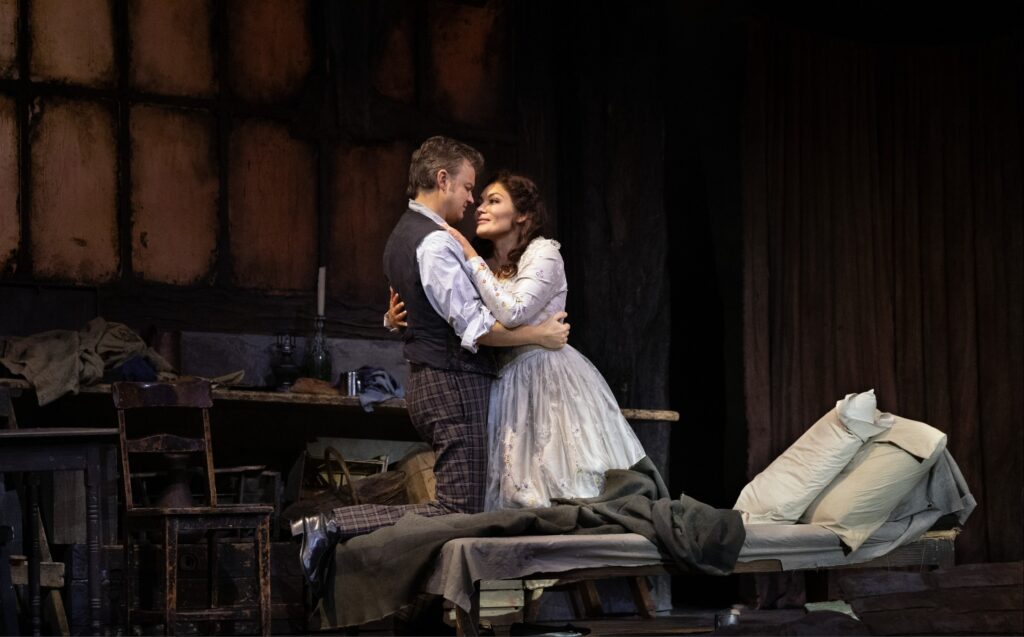
Ailyn Pérez Raises the Bar
Soprano Ailyn Pérez as Mimì took my breath away from the moment she stepped onto the stage. This was my first time experiencing Pérez live and I felt so lucky to be witnessing her in this role. Pérez’s voice is a brilliant instrument with crystalline high notes, an engaged and grounded middle range and a tonal palette of beautiful colors to express a range of emotions. Her presence is also one of greatness and gracefulness that elevates her performance’s delivery and depth. Her eyes are full of joy when she sings, making even the most upsetting moments of Mimí’s dying scene beautiful to watch.
Pérez is also an excellent collaborator. She made sure that every castmate was given the space and spotlight to shine, and she celebrated them along the way. Whether it was during Act two at Café Momus or in Act four as she lay dying, Pérez intuited her performance to be inclusive and intelligent at the same time. She looked her castmates in the eyes, she sang every note with conviction, she gave it her all while additionally supporting her castmates’ developing roles. This is the sign of a superstar and Pérez is absolutely one.
Her arias, “Sì. Mi chiamano Mimì” and “Donde lieta uscì,” revealed her voice’s agility and warmth, making these arias sound original in her own voice. Pérez brought Mimí to life and to death in this production through not only the quality of her vocal technique, but most notably through the destiny I feel she has to fulfill in this lifetime. I am excited to see her in future performances and celebrate her as she already is – a superstar.
Dmytro Popov’s Rising Star
Tenor Dmytro Popov as Rodolfo performed with promise and potential. I learned a lot while observing Popov’s performance. For example, in the moments when he was actively engaged with Watanabe and delivering his most crucial aria, “Che gelida manina,” Popov seemed to hand himself over to the music and come from a most vulnerable place of expression and evolution. He was at the will of Puccini’s design for Rodolfo and portrayed this role with conviction and honesty. There were also glimpses of his presence that were reminiscent of tenor Piotr Beczala in Met opera’s production of “Lohengrin.” This leads me to wonder what Popov would do in the role of Lohengrin and how he would continue his vocal and acting development in this way. I believe given the space and continued support, Popov will rise to become a brilliant star.
Popov’s interactions with Pérez’s Mimì were natural and actively engaging with Rodolfo’s deep love and affection for her. The most tender moments happened when the couple were not in the spotlight, and this is the ultimate sign of good chemistry in the works. Moments when I saw Popov keeping careful watch over Pérez, extending his hand or arm to her in comfort, allowing her to rest in the final scene before her death and intermittently checking in on her (making the role of Rolfo one of empathic response towards Mimì). These are the ways in which I felt Popov did his absolute best, leaving me wanting to see more performances by him in this way, especially Lohengrin.
It is interesting to discover what a tenor will do in this role and how he will do it. I feel it says a lot about the character of the singer themselves and for this I am grateful Popov was paired with Pérez in this season’s production. Bravo!
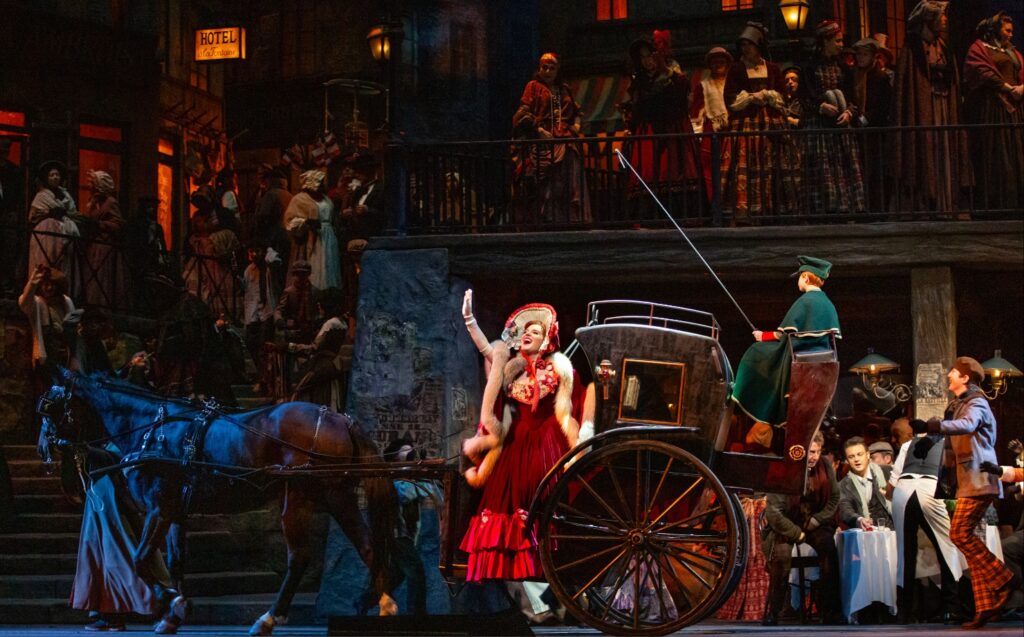
Emily Pogorelc Charms & Surprises
Soprano Emily Pogorelc as Musetta, who made her Met debut just this year as Lisette in “La Rondine,” was stunning in her role. In Francisco Salazar’s review of her performance in “La Rondine,” he says, “Pogorelc brought a fantastic lyric coloratura voice to the role of Lisette and while she doesn’t get an aria, her interactions with the other characters showcased a bright and crystalline voice. It didn’t hurt that her movement around the stage was filled with great flexibility and charisma and that she lit up the stage every time she entered.”
And this held true for her Musetta performance, as well.
Pogorelc’s Musetta felt like her golden opportunity to really open up and let loose the full brilliancy of her voice and presence on the Met’s stage. Her vocal agility and phrasing, especially during “Quando m’en vo’,” came across with ease and lightness to the effect of adding the unique quirkiness in her role’s personality that charms others, instead of what sometimes gets mixed in this role’s personality and confused as ego-centric manipulation.
Yes, Musetta wants all eyes on her, but Pogorelc stepped up Musetta’s game by giving the people what they really want – a showstopping vocal performance to never forget. Pogorelc made Musetta feel alive again! With all due respect to anyone’s vixen-personified interpretation of Musetta, I felt Pogorelc’s interpretation to be a more natural fit that illuminated Puccini’s vocal composition as a means to be the light amidst the darkness. Pogorelc’s Musetta transformed the banality of daily life, and ultimately patriarchal capitalism, making her role out to be the relief that only a dark comedy can provide. She was glorious!
Three Met Debuts in One Production
In his Met debut, baritone Boris Pinkhasovich as Marcello was an excellent addition to this production’s stunning cast. Pinkasovich’s voice is full bodied, highlighting his rich vocal textures and imaginative palette of expression. He gave the most depth to this role that I’ve experienced thus far. He also balanced out the voices of Popov as Rodolfo, Talos as Colline, and Kim as Schaunard. During the arias “Questo Mar Rosso” and “In un coupé?,” Pinkhasovich’s baritone rang out into Met opera’s hall with splendour and ease.
His duet with Pérez, “Mimì!,” was both heart-wrenching and gripping. There is more than meets the eye with Pinkhasovich and this added tremendously to the universal message of Puccini’s music in this opera. I also came across a Q&A with Pinkhasovich that helped me to understand more of the baritone’s process when taking on a role and what excites him most if one wants to read and learn more.
Also in his Met debut, baritone Gihoon Kim as Schaunard provided a carefree perspective to the cast. His over-the-top moments provided some comic relief, and he made Schaunard into a role full of his own personality. I always feel that taking risks in this way must be taken fully, and in this regard, Kim took on the risk of acting out in this role with full commitment. His take on Schaunard was an interesting part of the mix.
Kim’s next performance will be in the role of Rodrigo at Deutsche Oper Berlin for this season’s production of “Don Carlo.”
Rounding out the evening’s headlining cast of Met debut’s was bass Bogdan Talos in the role of Colline. His performance felt in line with this stellar cast and the production’s nostalgia at the same time. Talos’s voice resonated nicely during his aria, “ Vecchia zimarra, senti,” and left me wanting to hear more.
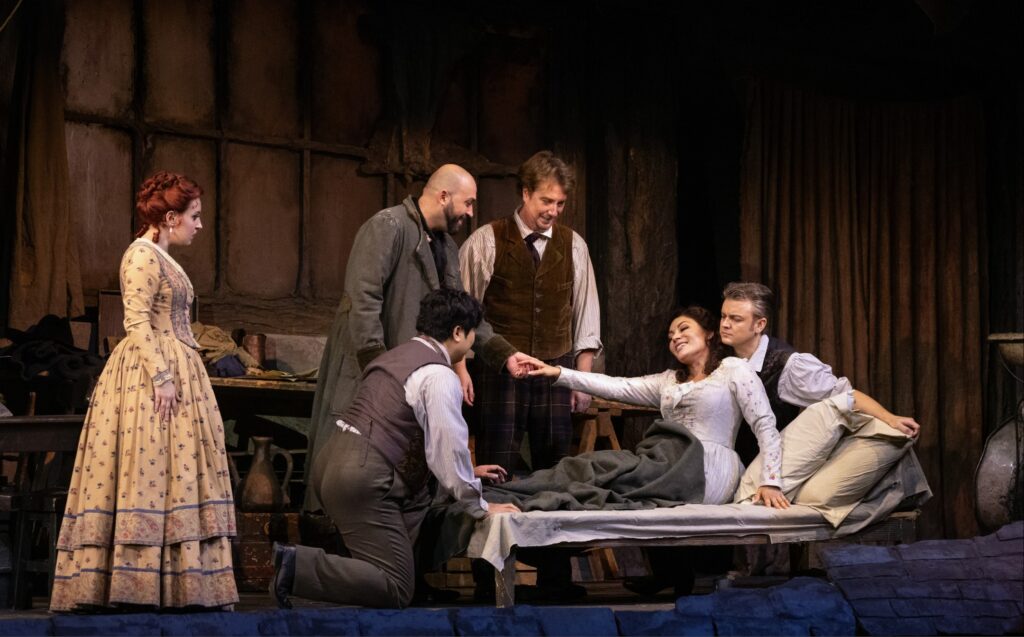
La Bohème Is the Gift That Keeps Giving
Baritone Donald Maxwell performed his legendary roles for this production, as Benoit and Alcindoro, always amusing and with perfect comedic timing. I always appreciate seeing him in this production, making it feel like the holidays are really upon us especially when everyone gathers in Café Momus.
It’s also important to note tenor Marco Jordão as parpignol who did an excellent performance full of jovial cheer.
The Met Opera Chorus sounded enthusiastic and full of joy, especially during the street scenes. The falling snow and entire Franco Zeffirelli production/set designs are rich with seasonal colors and make for a great family outing to be experienced together. Costume designs by Peter J. Hall and lighting design by Gil Wechsler added the special touches, wrapping up this season’s production of “La Bohème” as the gift that keeps giving.

